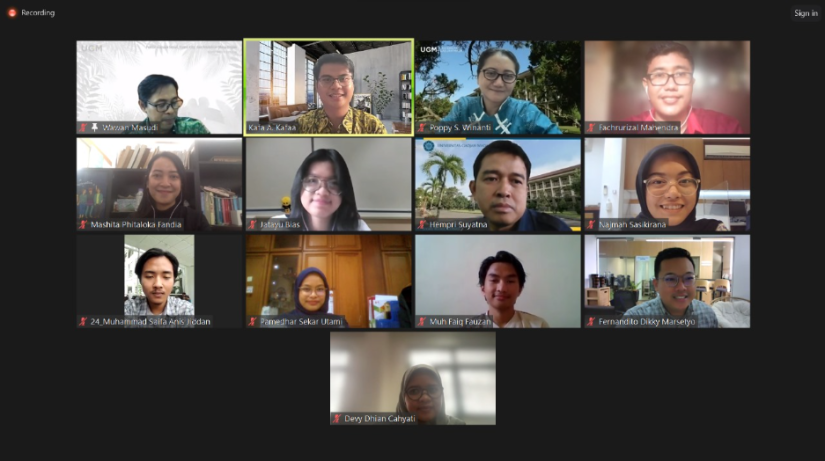
Yogyakarta, January 24th 2024─Faculty of Social and Political Sciences UGM is committed to encourage and support its students in participating in the Student Creativity Program (Program Kreativitas Mahasiswa/PKM). PKM itself is an event to facilitate as well as compete the creativity and innovation of students throughout Indonesia organized by the Directorate General of Higher Education, Ministry of Education and Culture.
“PKM is a very prestigious program. From year to year, FISIPOL UGM always contributes teams and achievements in PKM. We (the Faculty) think about the importance of the faculty in providing support and designing so that more and more Fisipol students are involved in PKM,” said Wawan Mas’udi, Dean of FISIPOL UGM, when giving a speech in the forum “Ngobrolin PKM di Fisipol 2024” organized by Career Development Center (CDC) FISIPOL UGM on Wednesday (24/1). The forum aims to socialize schemes that have been designed by FISIPOL UGM to support students in PKM activities as well as share experiences with PKM achievers in the previous year.
Poppy S. Winanti, Vice Dean for Student Affairs of FISIPOL, said that the Faculty has long had a research grant program. One of the schemes offered in the program is intended for student research groups. However, since the last few years, the scheme has been dedicated to helping students who participate in PKM activities. “For this year, we designed the PKM research grant scheme in accordance with the timeline set by the Higher Education,” said Poppy. The total funding that can be accessed by student research groups through the PKM research grant reaches Rp5,000,000. The funding can be accessed in stages, namely when passing the UGM internal proposal selection, passing the funding proposal selection from the Ministry of Education and Culture, and when passing the National Student Scientific Week (PIMNAS). For the record, PIMNAS is the final stage of the PKM series.
Apart from research grants, Fisipol also provides a Student Creativity and Achievement Sub Unit (KPM) which functions as a hub to coordinate and facilitate creative activities and student achievements. Regarding PKM, there are three things that become the main focus of KPM FISIPOL, namely networking and identification; capacity building; and monitoring and evaluation.
Screening and identification activities are carried out in the early stages, namely before and during registration. Then followed by capacity building activities carried out during the PKM stages, namely before registering, before and after passing funding, when heading to PIMNAS, and after completing PIMNAS. Capacity building activities are not only intended for students, but also for accompanying lecturers. KPM Fisipol also conducts intensive monitoring of students at every stage. This aims to make the progress made by students measurable and directed. Finally, after the PKM series was completed, a joint evaluation was carried out regarding all stages that had been carried out.
